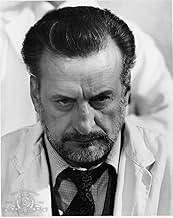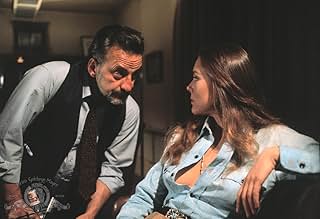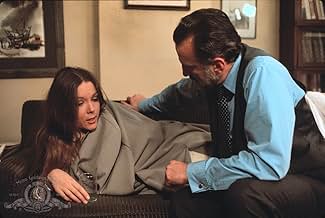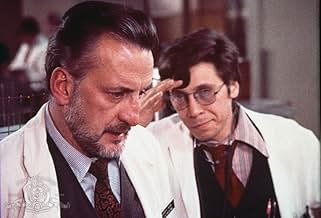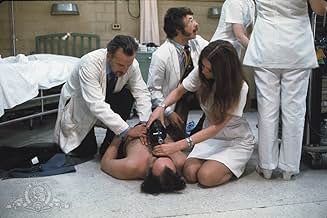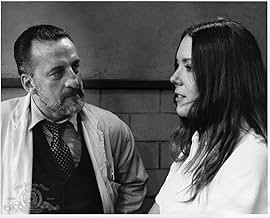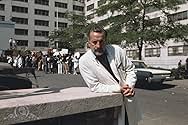AVALIAÇÃO DA IMDb
7,1/10
7,8 mil
SUA AVALIAÇÃO
Um chefe de pessoal do hospital luta para encontrar um sentido em sua vida durante uma série de mortes de pessoal.Um chefe de pessoal do hospital luta para encontrar um sentido em sua vida durante uma série de mortes de pessoal.Um chefe de pessoal do hospital luta para encontrar um sentido em sua vida durante uma série de mortes de pessoal.
- Ganhou 1 Oscar
- 7 vitórias e 5 indicações no total
Richard Dysart
- Dr. Welbeck
- (as Richard A. Dysart)
Avaliações em destaque
10cer1
Certainly the highlight of this film is it's cast.
Diana Rigg, George C. Scott, Bernard Hughes to mention a few.
I have accumulated more time in hospitals and with doctors over the years than I care to think about.
This comedy attacks the pomp and pretension in all aspects of our society, through the setting of one of it's "Most Haughty" institutions... the Medical profession.
The idea that such goings on could be possible, might be a shock to some, but is a delight to anyone with the perspective of experience.
Dr Brock (Scott) undergoes a mid-life crisis of monumental proportions before our eyes as we, and he, become enamored with the prospect of his involvement with Miss Drummond (Rigg).
The thread of the absurd is woven into this wonderful mix in the form of the irony that the Hospital appears to be killing it's own workers as they mismanage their affairs in it.
The climax is unpredictable (unless you've seen it) and made even more hilarious if you happen to guess.
It's not everyone's brand of humor, to be sure, and has uproariously funny "Dark Moments" if you're open to them.
I loved every minute, and was delighted to see it out on DVD.
Diana Rigg, George C. Scott, Bernard Hughes to mention a few.
I have accumulated more time in hospitals and with doctors over the years than I care to think about.
This comedy attacks the pomp and pretension in all aspects of our society, through the setting of one of it's "Most Haughty" institutions... the Medical profession.
The idea that such goings on could be possible, might be a shock to some, but is a delight to anyone with the perspective of experience.
Dr Brock (Scott) undergoes a mid-life crisis of monumental proportions before our eyes as we, and he, become enamored with the prospect of his involvement with Miss Drummond (Rigg).
The thread of the absurd is woven into this wonderful mix in the form of the irony that the Hospital appears to be killing it's own workers as they mismanage their affairs in it.
The climax is unpredictable (unless you've seen it) and made even more hilarious if you happen to guess.
It's not everyone's brand of humor, to be sure, and has uproariously funny "Dark Moments" if you're open to them.
I loved every minute, and was delighted to see it out on DVD.
Anyone who has spent time working in a hospital or medical facility has got to appreciate this film. The plot is absolutely wild but entertaining from start to finish. The acting is superb. George C. Scott is the brilliant doctor but class A failure as husband, father. Diana Riggs, a sex symbol of the 1960s and 1970s (of The Avengers), saves him from himself. The surrounding cast is superb and the dialogue quite entertaining. I think I enjoyed the film more on viewing it the 4th., 5th. or 6th. time because I caught that much more of the richness of the dialogue and the interplay of the characters. Well worth seeing again and again. You just won't want to check in to a hospital in the near future.
A hospital chief deals with a crisis while battling his own demons. This satire exaggerates situations to drive home its points, but it's a worthwhile black comedy. As with most of his films, Cheyefsky seems more interested in hitting his targets and pontificating than in telling a good story. The Scott character is similar to the William Holden character in "Network," a man with a failing marriage and suffering from menopause who has a chance to rekindle his manhood with a younger woman. Scott is quite good in conveying the middle-aged weariness and bitterness. Rigg is also fine as a hippie, but their instant love affair is not believable.
Anybody who goes to the Manhattan Hospital Center is taking his life in his hands. That includes the staff of The Hospital.
I had never seen The Hospital before and I was intrigued at how similar the characters and situations of the plot were to that other Paddy Chayefsky masterpiece, Network. There are elements in George C. Scott's character that have both Al Schumacher's and Howard Beale's.
He's the administrator of The Hospital and he's mad as hell and not going to take it any more. He's completely estranged from his wife and kids. It takes a Faye Dunaway type character in the person of Diana Rigg to make him snap out of it. One roll in the hay with her and he's shocked back to reality and the fact he still can contribute in the world.
But first he's got a real problem. Someone is out killing hospital staff, four of them in a 48 hour period. And the nice part is their deaths can be attributed to in large part to the general incompetence of a medical bureaucracy. That's where the comedy comes in.
There is an actual Howard Beale type character in the person of Barnard Hughes, Diana Rigg's father. His end is not quite as dramatic as Beale's though.
Back in my working days it was part of my job to pay medical suppliers. Some of them could be as big creeps as you'll find portrayed in The Hospital. The black comedy satire had some real bite to it for me.
George C. Scott was nominated for Best Actor, but having won and refused to accept the previous year's Oscar for Patton, he wasn't about to get a second chance. He lost to Gene Hackman for The French Connection. Still his handling of the role is unforgettable.
Try viewing The Hospital back to back with Network and see how many similarities you spot.
I had never seen The Hospital before and I was intrigued at how similar the characters and situations of the plot were to that other Paddy Chayefsky masterpiece, Network. There are elements in George C. Scott's character that have both Al Schumacher's and Howard Beale's.
He's the administrator of The Hospital and he's mad as hell and not going to take it any more. He's completely estranged from his wife and kids. It takes a Faye Dunaway type character in the person of Diana Rigg to make him snap out of it. One roll in the hay with her and he's shocked back to reality and the fact he still can contribute in the world.
But first he's got a real problem. Someone is out killing hospital staff, four of them in a 48 hour period. And the nice part is their deaths can be attributed to in large part to the general incompetence of a medical bureaucracy. That's where the comedy comes in.
There is an actual Howard Beale type character in the person of Barnard Hughes, Diana Rigg's father. His end is not quite as dramatic as Beale's though.
Back in my working days it was part of my job to pay medical suppliers. Some of them could be as big creeps as you'll find portrayed in The Hospital. The black comedy satire had some real bite to it for me.
George C. Scott was nominated for Best Actor, but having won and refused to accept the previous year's Oscar for Patton, he wasn't about to get a second chance. He lost to Gene Hackman for The French Connection. Still his handling of the role is unforgettable.
Try viewing The Hospital back to back with Network and see how many similarities you spot.
Hospital (1971)
George C. Scott is amazing, just terrific as a struggling, aging, world-weary doctor. A couple of the speeches he gives (from the sharply written screenplay) are first rate quotable stuff. See this movie for him alone.
Overall, this is certainly a New Hollywood movie, straight out of the late 1960s politics and sexual revolution. It's also a bit of a middle-aged male fantasy (the director and writer and main actor being of course all middle aged males). I mean, a key line in the movie is when young and slightly batty Barbara, played by Diana Rigg (Emma Peel in the television series "The Avengers"), says to the very middle aged George C. Scott, "I have a thing for middle aged men." Or something to that effect--and you know what happens next.
But that's the weakest part of the movie. The best part is the hospital scene itself, the chaotic and scary lack of medical professionalism at an under-funded big city medical center. Scott plays the chief of medicine, Dr. Bock, and he gradually sniffs out a truly murderous element to the place, a kind of whodunnit built into this otherwise growing drama of doctors inside and protesters outside (usually) and a general sense that the old order isn't able to keep order against the rising restlessness of young people and their demands.
In a way, the flakiness of Barbara and the rock-steady but yet suicidal authority of Bock are symbolic of the two sides, the two generations, that signified so much back then. Barbara suggests dropping out and turning on, and the doctor grows to the idea. I mean, who wouldn't in his shoes, having Diana Rigg begging you to leave your miserable job and life and moving to the mountains of Mexico to make babies. That's no exaggeration--that's the carrot, and the doctor sees it the way many people saw it then, the escape as a reasonable alternative to a crumbling world.
And yet, the hospital has needs, like dying people, and a group of people displaced from their apartment building next door, and of course this murderer on the loose.
In a way, it's a sloppy, terribly constructed movie. But it has an element of abandonment and realism from the era that really works. If you just go along with the superficial parts of the plot, which are fun, you might just get sucked into the tawdry medical world in 1971 Manhattan.
The writer, by the way, is Paddy Chayefsky, and he won his second Oscar for this screenplay. It was considered that timely and sharp at the time, and there is some terrific writing, some really good dialog to keep it humming. (He did a ton of television, but also next wrote the screenplay for "Network," winning his third Oscar for that.)
The director, Arthur Hiller, moved from 1960s television to movie directing and made a lot of middling fare, though a few became well known such as "Love Story" (1970) and "Man of La Mancha" (1972). The cinematographer Victor J. Kemper is straight out of New Hollywood and his style feels beautifully unpolished and complex (he went on to do a lot of solid movies, some really terrific like "Dog Day Afternoon"), and this helps hold the disparate plot elements together.
George C. Scott is amazing, just terrific as a struggling, aging, world-weary doctor. A couple of the speeches he gives (from the sharply written screenplay) are first rate quotable stuff. See this movie for him alone.
Overall, this is certainly a New Hollywood movie, straight out of the late 1960s politics and sexual revolution. It's also a bit of a middle-aged male fantasy (the director and writer and main actor being of course all middle aged males). I mean, a key line in the movie is when young and slightly batty Barbara, played by Diana Rigg (Emma Peel in the television series "The Avengers"), says to the very middle aged George C. Scott, "I have a thing for middle aged men." Or something to that effect--and you know what happens next.
But that's the weakest part of the movie. The best part is the hospital scene itself, the chaotic and scary lack of medical professionalism at an under-funded big city medical center. Scott plays the chief of medicine, Dr. Bock, and he gradually sniffs out a truly murderous element to the place, a kind of whodunnit built into this otherwise growing drama of doctors inside and protesters outside (usually) and a general sense that the old order isn't able to keep order against the rising restlessness of young people and their demands.
In a way, the flakiness of Barbara and the rock-steady but yet suicidal authority of Bock are symbolic of the two sides, the two generations, that signified so much back then. Barbara suggests dropping out and turning on, and the doctor grows to the idea. I mean, who wouldn't in his shoes, having Diana Rigg begging you to leave your miserable job and life and moving to the mountains of Mexico to make babies. That's no exaggeration--that's the carrot, and the doctor sees it the way many people saw it then, the escape as a reasonable alternative to a crumbling world.
And yet, the hospital has needs, like dying people, and a group of people displaced from their apartment building next door, and of course this murderer on the loose.
In a way, it's a sloppy, terribly constructed movie. But it has an element of abandonment and realism from the era that really works. If you just go along with the superficial parts of the plot, which are fun, you might just get sucked into the tawdry medical world in 1971 Manhattan.
The writer, by the way, is Paddy Chayefsky, and he won his second Oscar for this screenplay. It was considered that timely and sharp at the time, and there is some terrific writing, some really good dialog to keep it humming. (He did a ton of television, but also next wrote the screenplay for "Network," winning his third Oscar for that.)
The director, Arthur Hiller, moved from 1960s television to movie directing and made a lot of middling fare, though a few became well known such as "Love Story" (1970) and "Man of La Mancha" (1972). The cinematographer Victor J. Kemper is straight out of New Hollywood and his style feels beautifully unpolished and complex (he went on to do a lot of solid movies, some really terrific like "Dog Day Afternoon"), and this helps hold the disparate plot elements together.
Você sabia?
- CuriosidadesWhen Dr. Herbert Bock rants, "We have established the most enormous, medical...entity ever conceived and people are sicker than ever!" the slight pause, searching for the word "entity", was spontaneously ad-libbed by George C. Scott to save the take. The scripted line was, "we have ASSEMBLED the most enormous medical ESTABLISHMENT ever conceived." Scott heard his slip in mid-sentence, so he reworded the line so as to not make it repetitive. Director Arthur Hiller loved the save so much he used that take in the movie.
- Erros de gravaçãoBarbara Drummond says that she lived for a year with the Hopi Indians, but she mispronounces "Hopi" as "Ho-pye."
- Citações
Herbert Bock: I mean, where do you train your nurses, Mrs. Christie--Dachau?
- Cenas durante ou pós-créditosAlthough Barnard Hughes played two distinct roles, the end credits lists Hughes as playing the role of Drummond but not Dr. Mallory.
- ConexõesFeatured in Best! Movies! Ever!: Hospitals (2007)
Principais escolhas
Faça login para avaliar e ver a lista de recomendações personalizadas
- How long is The Hospital?Fornecido pela Alexa
Detalhes
- Data de lançamento
- País de origem
- Idioma
- Também conhecido como
- The Hospital
- Locações de filme
- Empresa de produção
- Consulte mais créditos da empresa na IMDbPro
Bilheteria
- Faturamento bruto nos EUA e Canadá
- US$ 19.711.560
Contribua para esta página
Sugerir uma alteração ou adicionar conteúdo ausente



